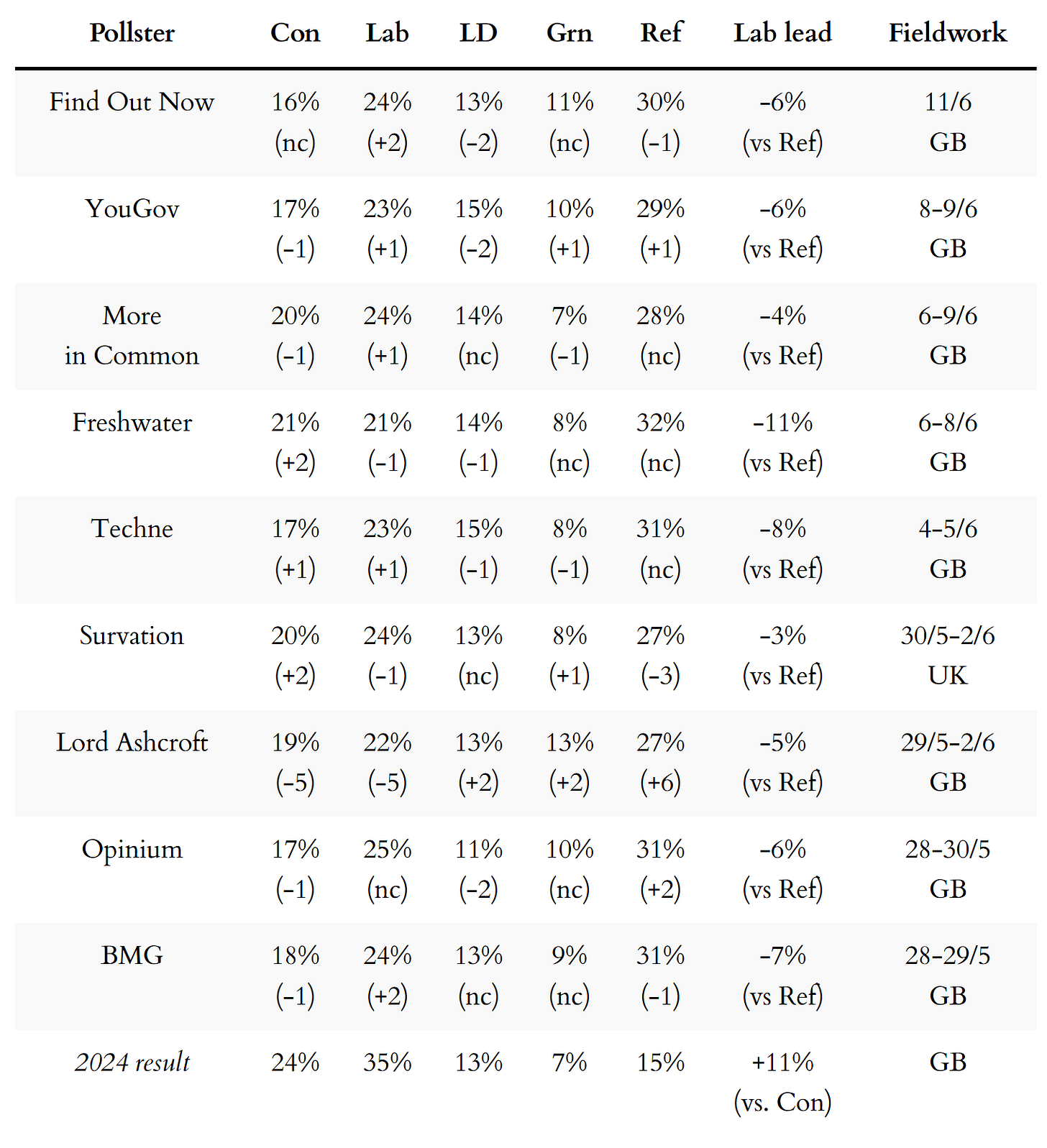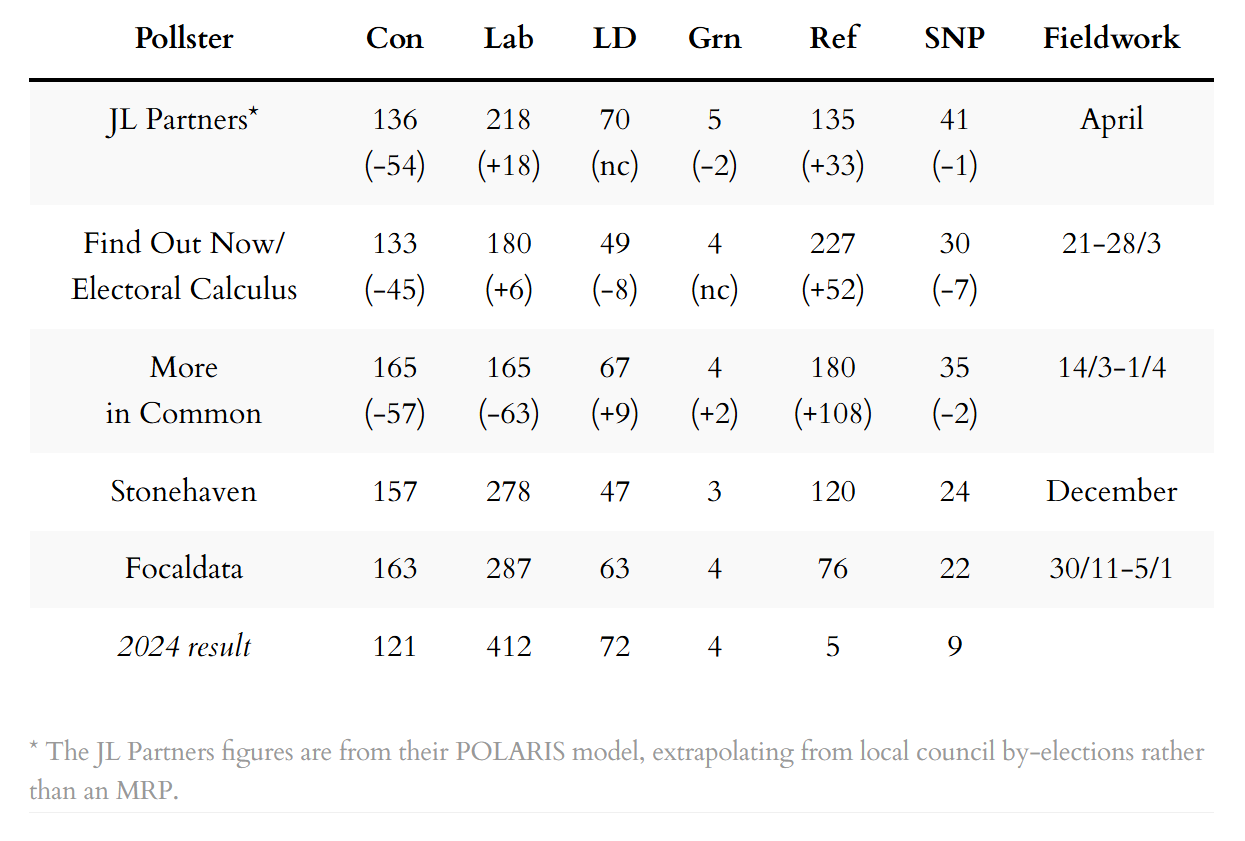Welcome to the 165th edition of The Week in Polls (TWIP) which takes a look at what the polls are telling us about voting intention figures for different parties.
Then it is a summary of the latest national voting intention polls and a round-up of party leader ratings.
Those are followed by, for paid-for subscribers, 10 insights from the last week’s polling and analysis.
This time, those ten include the reasons given by those who voted Labour at the general election but have since abandoned the party.
The Week in Polls often draws on the work of those at UK universities, so a little thank you for me in return with a special offer for anyone with a .ac.uk email address: you can sign up for the paid-for version of this newsletter at half price:
And with that, on with the show.
Want to know more about political polling? Get my book Polling UnPacked: the history, uses and abuses of political opinion polling.
A new pollster and an overview of where the polls now stand

Hello, Freshwater
There is a new entrant in the ranks of polling companies regularly producing voting intention polls in the UK. It is Freshwater Strategy, a firm founded in Australia in 2022. It was co-founded by Mike Turner who was previously on the British political polling scene in 2014-19 with roles at Survation and BMG, before going to work for Lynton Crosby’s CT Group. His departure from there seems to have been somewhat lively judging by some of the mainstream press coverage.
Freshwater’s polling was not among the best at the last Australian federal election. But, plenty of polling firms have bounced back from such performances at one election to excelling at a future one.
Here in the UK, Freshwater is a member of the Market Research Society (MRS) and says in its data files that it, “is currently applying to be a member of the British Polling Council (BPC) and abides by their rules.” That matches my experience too, finding all the crosstab details I would expect from a BPC firm, and they also fully and promptly answered a query I had.
Their six published polls with City AM since the start of the year have produced voting intention figures similar to those of other pollsters. Their numbers so far seem to bounce around rather more than most pollsters. But as I’ve written before about Ipsos, I find such variation reassuring as it shows that the pollster is not weighting the figures to death and instead getting some genuine sample variation. (Just as I would more believe that a coin is a fair coin if, when I do batches of tossing it 10 times, I get varying numbers of heads including sometimes up close to or even equal to 10, rather than if got exactly 5 out of 10 every single time. That would be suspicious.)
In that sense, Freshwater are very different from Techne, whose polls show very little variation week on week. Techne has a coherent case for why weighting out random variation is a good thing, and whether you agree with my instinctive preference for more variation or you are keener like Techne on less, it is certainly good that we have now greater variety among the regular pollsters.
Another bit of variety is with Freshwater’s best PM question. The wording they use does not look significantly different from that used by other pollsters - “Who would you prefer to see as Prime Minister? “ - but they do get much better figures for Kemi Badenoch relative to Keir Starmer than other pollsters, and indeed are the only pollster this year to have had her ahead of Starmer on a direct match up between the two.
The bigger picture
The broad picture has been consistent, even becoming more consistent, across all the different pollsters. Find Out Now is not looking the significant outlier that it did for a stretch a while back.
May was a big month for polling change across them all the pollsters, with Reform’s vote share figures significantly up and the party moving into a clear lead over Labour in most polls, after several months of the two parties having been close to each other.
While Reform’s support grew 4-5 points in May, the first half of June has seen that plateau, with support static, but sustained at just under 30% on average.
There are some tentative signs for Labour that its long post-election slide in the polls has bottomed out so far in June, though at an average in the low 20s.
For the Conservatives, their polling rating took a particular blow in May and since has only slid a little further. But it is now very regularly under 20%, a figure that would usually be crisis inducing.
It also means that some pollsters are now putting the Lib Dems very close to, or even sometimes tied or ahead of, the Conservatives. There is quite some variation between pollsters on this, however. A large batch of pollsters gives the Conservatives a consistent half a dozen or so points margin over the Lib Dems while YouGov, Techne and Find Out Now have the Lib Dems breathing down the necks of the Conservatives.
Overall, the Lib Dem poll rating is now averaging just under 15% and is the party’s best ratings, saving for the Brexit boomlet of 2019, since July 2010. The poll rating is also double what it was this time in the last Parliament, and has been creeping up steadily all year.
In a fit of generosity, I will also speculate that the gradual inching up of the Lib Dems towards the declining Conservatives in the polls is just the sort of incremental sustained trend that the news media in general are not great at covering whatever field it comes in. That is perhaps why we get so much speculation about other bits of polling and almost nothing about whether the Conservatives may slip clearly behind the Lib Dems.
Finally, if you want an even longer running picture of gradual change in the polls, that comes with the Greens, now averaging around 9% in the polls, having been slowly creeping up all year.
Two things, then, are clear and one less so. The two clear things are that the combined Labour and Conservative share, the traditional big two parties, is at sustained extremely low levels. The second is that Reform is consistently a few points ahead in the polls.
What is less clear - because the pollsters vary more and because the margins are sufficiently small to risk getting beyond the level of accuracy we can reasonably expect from voting intention polls - is how close we are to dramas over the third/fourth/fifth placings in the polls.
If the likes of YouGov are right, and if things continue as they have been going, then Reform being in first place may turn out to be only Act One of traditional party standings being overturned.
Two big ifs, of course.
Voting intentions and leadership ratings
Here are the latest national voting intention figures from each of the pollsters currently active:
Next, the latest seat projections from MRP models and similar, also sorted by fieldwork dates:
Finally, a summary of the latest leadership ratings, sorted by name of pollster.
For more details, and updates during the week as each new poll comes out, see my regularly updated tables here and follow The Week in Polls on Bluesky.
For the historic figures, including Parliamentary by-election polls, see PollBase.
Catch-up: the previous two editions
My privacy policy and related legal information is available here. Links to purchase books online are usually affiliate links which pay a commission for each sale. For content from YouGov the copyright information is: “YouGov Plc, 2018, © All rights reserved”.1
Quotes from people’s social media messages sometimes include small edits for punctuation and other clarity.
Please note that if you are subscribed to other email lists of mine, unsubscribing from this list will not automatically remove you from the other lists. If you wish to be removed from all lists, simply hit reply and let me know.
What people think about the benefits of growth, and other polling news
The following 10 findings from the most recent polls and analysis are for paying subscribers only, but you can sign up for a free trial to read them straight away.
I am cautious about pouring over polling in the aftermath of a Budget or Spending Review because the evidence is, whether they turn out to be brilliantly successful or a disaster, then outside of the Liz Truss world, Budgets do not move
Keep reading with a 7-day free trial
Subscribe to The Week in Polls to keep reading this post and get 7 days of free access to the full post archives.






